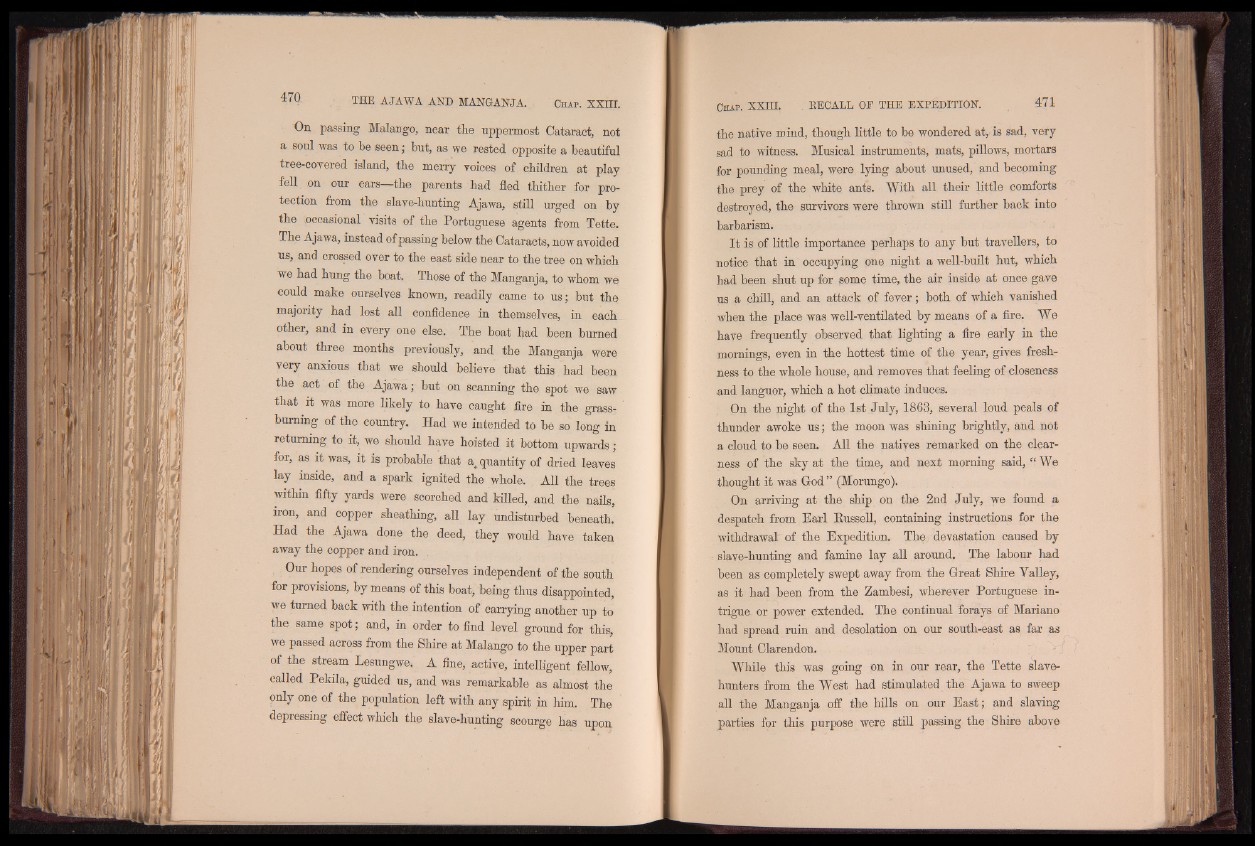
On passing Malango, near the uppermost Cataract, not
a soul was to be seen; but, as we rested opposite a beautiful
tree-coyered island, the merry voices of children at play
fell on our ears—the parents bad fled thither for protection
from the slave-hunting Ajawa, still urged on by
the .occasional visits of the Portuguese agents from Tette.
The Ajawa, instead of passing below the Cataracts, now avoided
us, and crossed over to the east side near to the tree on which
we had hung the boat. Those of the Manganja, to whom we
could make ourselves known, readily came to us; but the
majority had lost all confidence in themselves, in each
other, and in every one else. The boat had been burned
about three months previously, and the Manganja were
very anxious that we should believe that this had been
the act of the Ajawa; hut on scanning the spot we saw
that it was more likely to have caught fire in the grass-
burning of the country. Had we intended to he so long in
returning to it, we should have hoisted it bottom upwards;
for, as it was, it is probable that a quantity of dried leaves
lay inside, and a spark ignited the whole. All the trees
within fifty yards were scorched and killed, and the nails,
iron, and copper sheathing, all lay undisturbed beneath.
Had the Ajawa done the deed, they would have taken
away the copper and iron.
Our hopes of rendering ourselves independent of the south
for provisions, by means of this boat, being thus disappointed,
we turned back with the intention of carrying another up to
the same spot; and, in order to find level ground for this,
we passed across from the Shire at Malango to the upper part
of the stream Lesungwe, A fine, active, intelligent fellow,
called Pekila, guided us, and was remarkable as almost the
only one of the population left with any spirit in him. The
depressing effect which the slave-hunting scourge has upon
the native mind, though little to he wondered at, ig sacb veI7
sad to witness. Musical instruments, mats, pillows, mortars
for pounding meal, were lying about unused, and becoming
the prey of the white ants. With all their little comforts
destroyed, the survivors were thrown still further back into
barbarism.
I t is of little importance perhaps to any hut travellers, to
notice that in occupying one night a well-built hut, which
had been shut up for some time, the air inside at once gave
us a chill, and an attack of fever; both of which vanished
when the place was well-ventilated by means of a fire. We
have frequently observed that lighting a fire early in the
mornings, even in the hottest time of the year, gives freshness
to the whole house, and removes that feeling of closeness
and languor, which a hot climate induces.
On the night of the 1st July, 1863, several loud peals of
thunder awoke u s; the moon was shining brightly, and not
a cloud to he seen. All the natives remarked on the clearness
of the sky at the time, and next morning said, “ We
thought it was God ” (Morungo).
On arriving at the ship on the 2nd July, we found a
despatch from Earl Russell, containing instructions for the
withdrawal of the Expedition. The devastation caused by
slave-hunting and famine lay all around. The labour had
been as completely swept away from the Great Shire Valley,
as it had been from the Zambesi, wherever Portuguese intrigue
or power extended The continual forays of Mariano
had spread ruin and desolation on our south-east as far as
Mount Clarendon.
While this was going on in our rear, the Tette slave-
hunters from the West had stimulated the Ajawa to sweep
all the Manganja off the hills on our East; and slaving
parties for this purpose were still passing the Shire above